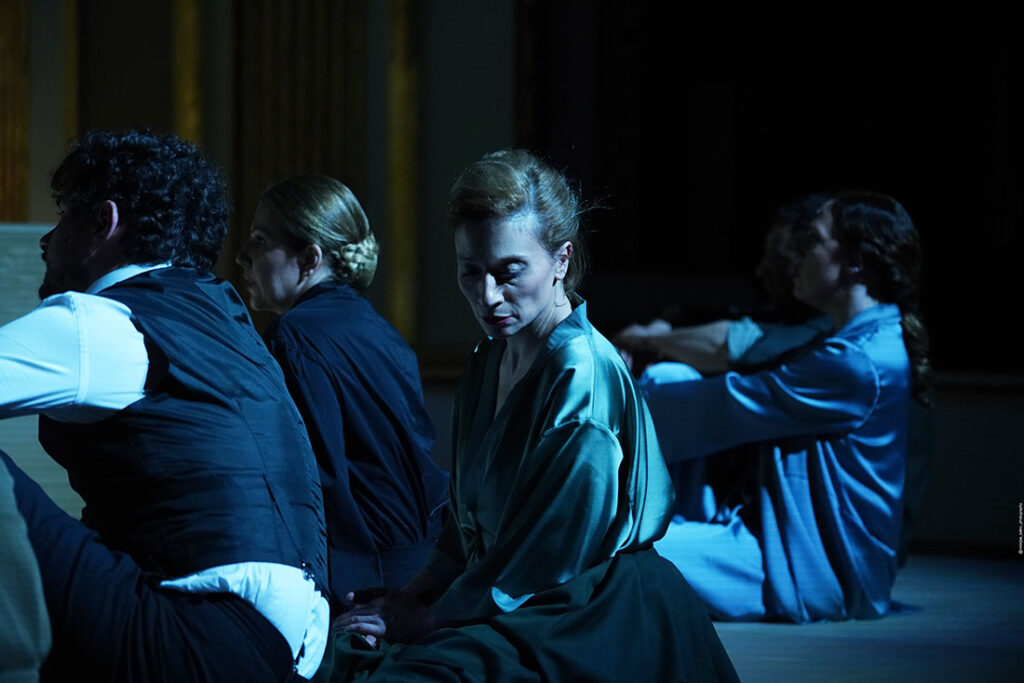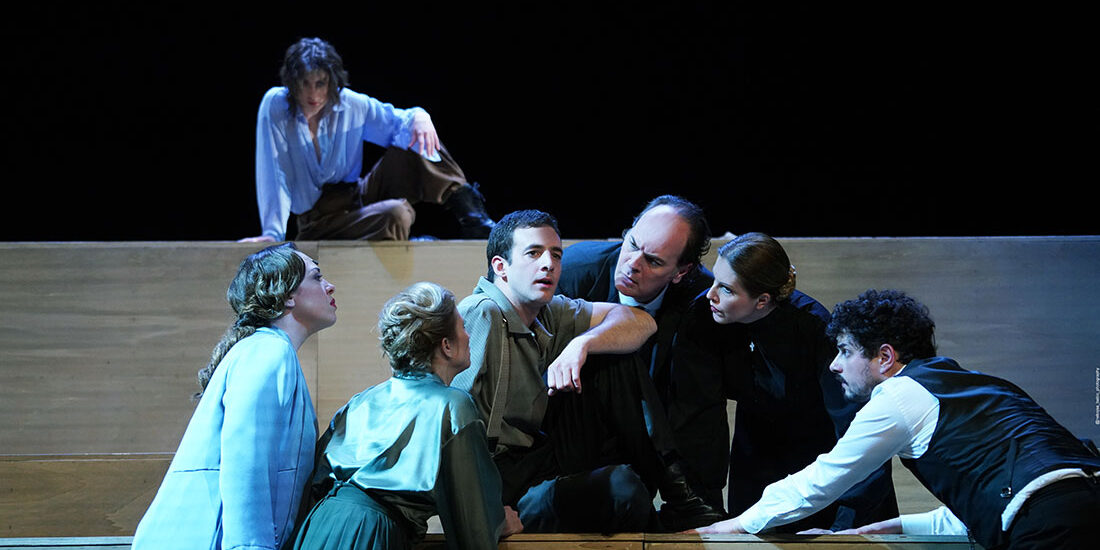National Theatre Belgrade, premiere 4th April 2023
Slobodan Selenić’s 1985 novel Fathers and Forefathers is the subject of polemics, as are several other novels by this prolific and award-winning author. While for some he is an author who perfectly knows the depths and complexity of the human psyche and historical turmoil, for others he is an author whose novels are full of nationalism and homophobia.
Fathers and Forefathers is about three generations of men of the Belgrade bourgeois Medaković family in the first half of the 20th century, through the Second World War and into the period immediately after the war.
The three generations of Medakovićs in the novel are representative of the clash of different cultures and the upheavals that such collisions cause. Milutin, a Serbian merchant from Slavonia, who feels deep loyalty and religious admiration for his free and heroic brothers from Serbia, moves to Belgrade, bringing Austro-Hungarian customs and traditions with him. He is torn between Serbia in his soul and Austria-Hungary in his skin: Milutin’s fervent Serbianism in the big things does not match his orientation towards Europe in the small things.
His son Stevan is studying in England, where his national identity is called into question. Robert Rackham, a gay man, falls in love with him, about which Stevan reflects: Apart from the healthy resistance of a young and unspoilt nation, Serbian hatred of homosexuality, as I said, also has historical roots, for the perverse and depraved Turks are very prone to sodomy in their rule, thereby humiliating their Serbian hosts. Stevan finds refuge from such “decadent” English homosexual “debauchery” in his love for the Englishwoman Elizabeth Blake. But marrying a foreigner brings with it new doubts: What do I want from this foreigner? Or – am I capable of marrying a foreigner (…)? Is this the beginning of my great conversion? Have I – as I literally convinced myself until yesterday – turned my faith around?
Milutin’s grandson, Stevan’s son, is the result of the mixing of two bloodlines. His mixed ancestry is also controversial. This is what Stevan thinks about his son: Has the English rust torn and broken our family thread, which ran through the murky Turkish and Austrian times, at one point? Does the mixture of Serbian salt and English base produce a poisonous acid? Stevan sees his internationally conceived son almost as a break in the line of ancestors: the time has come for a great rupture, the emergence of a beginning that is preceded by nothing, the present without a past, the time of sons without fathers and mothers, the time of fathers without successors.
Literary critics interpret such a family saga in different ways. Predrag Palavestra and Vladislava Ribnikar, for example, are of the opinion that there is no real communication between people and that linguistic and cultural barriers are an indication of deeper and more important misunderstandings and disagreements. Dejan Ilić interprets Fathers and Forefathers“, but also two other Selenić novels, Friends and Timor Mortis, in a different way. For him, the inner division into two opposing ethnic-cultural differences is usually already present at the very beginning of an encounter with another, as an assumption that predetermines the failure of the encounter. Therefore, he not only sees a multicultural society thematised and problematised in the novel, but is of the opinion that the novel is ideologically positioned on the viewpoint that different ethnicities and cultures cannot meet successfully because prejudices rule out such a possibility from the outset.

Fathers and Forefathers – National Theatre Belgrade
This somewhat longer than usual introduction to the text is necessary in order to understand what the creative team behind the staging of Fathers and Forefathers have done with material. The National Theatre material was realised in such a way that the above-mentioned interpretative dilemma is not noticeable, one could even say that the production is more on the side of Dejan Ilić’s views, who tries to transform the conservatism of the novel into a more open-minded attitude.
This was initially achieved by changing the medium in which the story is set. The novel is mainly narrated by Stevan Medaković, with his ethnocentric perspective dominating all events and characters. On a stage where there is no such focus, each character gains autonomy, and there is no superior voice, nothing to push the meaning in a certain direction. Kata Gyarmati’s meticulous dramatization has, so to speak, created a concentrate of the novel’s level of ideas, in which events, thoughts and feelings flow into one another. Instead of a traditional dramatization, in which the action takes place in alternating individual scenes, the text of the play flows as an indivisible whole, in which all the characters, different generations of Medaković, are present at the same time.
With such a dramatization, director Veljko Mićunović has the opportunity to place the action in a space that cannot be precisely defined, but represents something like a courtroom, a parliament or an academic hall in which an equal symposium of generations, ideologies and emotions takes place. Four staggered rows of tables symbolically mark the space for debate, exchange and confrontation of opinions. The simultaneous presence of three generations means that all characters are treated equally in a true polyphony of voices.
Most notably of all, the vocal music of composer Nevena Glušica is performed by the actors. While some speak, others hum soft, thin and gentle long notes, creating a simple melody that contributes significantly to the atmosphere of the play and the seamless transition of events. The music also plays an important role on the level of meaning. The same melody is sung in different situations and not always with the same text. In this way, the repetition of the basic thematic thread that characterises the three generations, but also their development, is emphasised. The identity crisis that plagues the Medakovićs is sung in different verses to the same melody in English: “I have no name” and “My name is joy”.
The acting expression is in harmony with Glušica’s calm and gentle music. The ensemble performs with even intensity, which indicates that the director has gone to great lengths to create a unique, ethereal atmosphere. On the borderline between realistically motivated and stylistically controlled speech, the actors emphasise the nodes of ideas and the climaxes of the plot with opposite means – they express tension and stormy emotions with the means of composure and calm. Under the given circumstances, the entire ensemble shines and it is difficult to single out individual performances, but Aleksandar Vučković, a young actor, shows an explosion of anger, sharp rebuke and firmness of conviction through restraint and calm delivery in nuances.
The theme of this play is still very topical, not only in Serbia, but also in a broader sense, when we consider the multicultural situation after the great migrant crises. In terms of form, it is unique and modern. It is exciting in a special way. Instead of loud exclamations and tectonic actions, it speaks in a calm, at the same time deeply emotional and thoroughly thought-out way about the important issue of ethnic and cultural differences and the possibilities of living together with these differences. In its form, this play is an example of an exemplary conversation about sensitive issues which also comes with the heavy baggage of history. If we allow ourselves to be overwhelmed by division, we run the risk of being characters in similar plays by our descendants. I would like us to speak in the tone of this play so that our posterity will say how boring we were because we respected each other.
Credits:
Dramatization: Kata Đarmati//Director: Veljko Mićunović//Dramaturg Kata Đarmati//Scenography: Zorana Petrov//Costume: Marija Marković Milojev //Composer: Nevena Glušica
For tickets and further information, visit: Narodnopozoriste.rs
Andrej Čanji is a theatre critic and theatrologist based in Belgrade.








